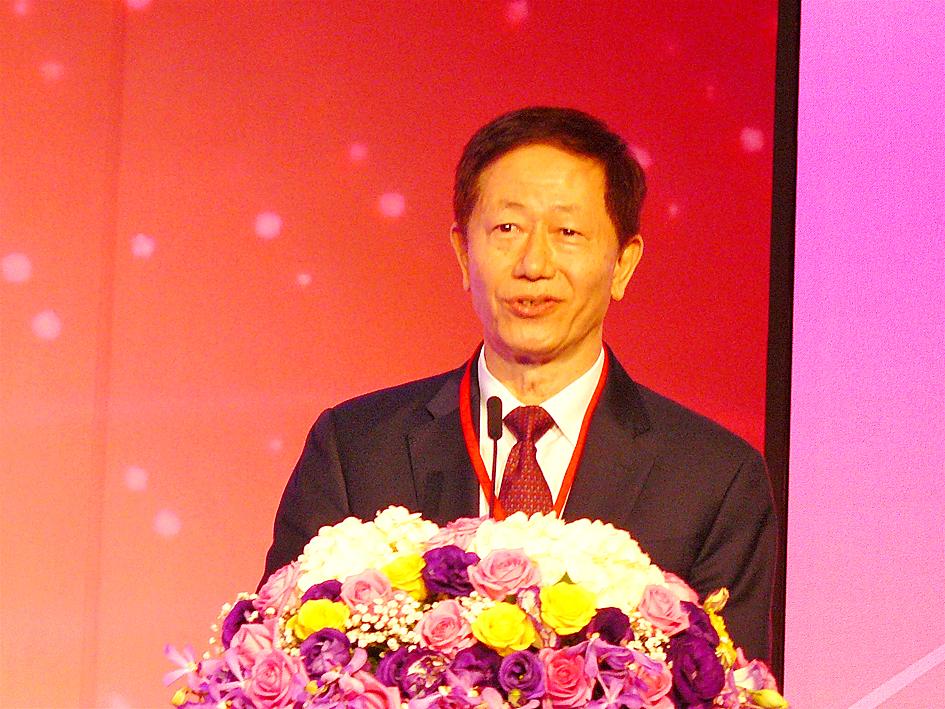The production value of Taiwan’s semiconductor industry is expected to increase 24.7 percent this year and surpass NT$4 trillion (US$143.8 billion) after growing 20.9 percent last year, Taiwan Semiconductor Manufacturing Co (TSMC, 台積電) chairman Mark Liu (劉德音) said yesterday.
Speaking at the online annual meeting of the Taiwan Semiconductor Industry Association (台灣半導體協會), Liu said that Taiwan remained competitive in the global semiconductor industry, despite the impact from the COVID-19 pandemic over the past two years.
The nation continues to be the No. 1 supplier in the semiconductor manufacturing sector and the IC packaging and testing services sector, he said.

Photo: CNA
Taiwan remains the second-largest supplier in the IC design sector, he added.
Liu said he hoped young talent would join the local semiconductor industry to help the industry further progress.
He urged the government to map out a long-term plan for land, water and electricity supply, as well as environmental protection, to facilitate corporate sustainability.
Trade tensions between the US and China are expected to continue to pose challenges for every industry in the world, including the semiconductor industry, Liu said.
The US is pushing for domestic semiconductor manufacturing, with Intel Corp planning to expand its investments in the country.
TSMC founder Morris Chang (張忠謀) on Tuesday said that it would be hard for the US to do this, as it does not have a comprehensive supply chain like Taiwan and its production costs are high.
Separately, cooperation between Taiwan and the US on the semiconductor front can be a basis for advancing a potential bilateral trade agreement (BTA) between the two sides, Minister of Economic Affairs Wang Mei-hua (王美花) said at an online energy forum yesterday.
“A BTA signed on the basis of semiconductor cooperation will have further significance,” Wang said. “It will also strengthen the rules of the game for industrial development, such as intellectual property rights and the protection of commercial secrets.”
Wang said the US-Taiwan cooperation goes beyond chips and there is potential for cooperation in the realms of electric vehicles, 5G and other areas.
Additional reporting by Angelica Oung

SEMICONDUCTORS: The firm has already completed one fab, which is to begin mass producing 2-nanomater chips next year, while two others are under construction Taiwan Semiconductor Manufacturing Co (TSMC, 台積電), the world’s largest contract chipmaker, plans to begin construction of its fourth and fifth wafer fabs in Kaohsiung next year, targeting the development of high-end processes. The two facilities — P4 and P5 — are part of TSMC’s production expansion program, which aims to build five fabs in Kaohsiung. TSMC facility division vice president Arthur Chuang (莊子壽) on Thursday said that the five facilities are expected to create 8,000 jobs. To respond to the fast-changing global semiconductor industry and escalating international competition, TSMC said it has to keep growing by expanding its production footprints. The P4 and P5

DOWNFALL: The Singapore-based oil magnate Lim Oon Kuin was accused of hiding US$800 million in losses and leaving 20 banks with substantial liabilities Former tycoon Lim Oon Kuin (林恩強) has been declared bankrupt in Singapore, following the collapse of his oil trading empire. The name of the founder of Hin Leong Trading Pte Ltd (興隆貿易) and his children Lim Huey Ching (林慧清) and Lim Chee Meng (林志朋) were listed as having been issued a bankruptcy order on Dec. 19, the government gazette showed. The younger Lims were directors at the company. Leow Quek Shiong and Seah Roh Lin of BDO Advisory Pte Ltd are the trustees, according to the gazette. At its peak, Hin Leong traded a range of oil products, made lubricants and operated loading

The growing popularity of Chinese sport utility vehicles and pickup trucks has shaken up Mexico’s luxury car market, hitting sales of traditionally dominant brands such as Mercedes-Benz and BMW. Mexicans are increasingly switching from traditionally dominant sedans to Chinese vehicles due to a combination of comfort, technology and price, industry experts say. It is no small feat in a country home to factories of foreign brands such as Audi and BMW, and where until a few years ago imported Chinese cars were stigmatized, as in other parts of the world. The high-end segment of the market registered a sales drop

Citigroup Inc and Bank of America Corp said they are leaving a global climate-banking group, becoming the latest Wall Street lenders to exit the coalition in the past month. In a statement, Citigroup said while it remains committed to achieving net zero emissions, it is exiting the Net-Zero Banking Alliance (NZBA). Bank of America said separately on Tuesday that it is also leaving NZBA, adding that it would continue to work with clients on reducing greenhouse gas emissions. The banks’ departure from NZBA follows Goldman Sachs Group Inc and Wells Fargo & Co. The largest US financial institutions are under increasing pressure